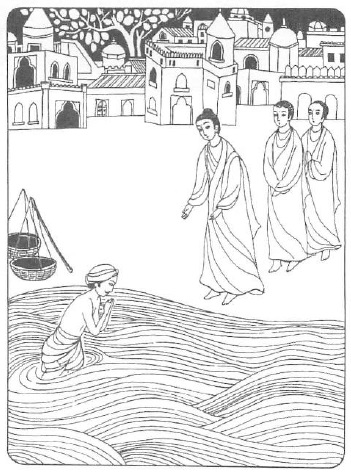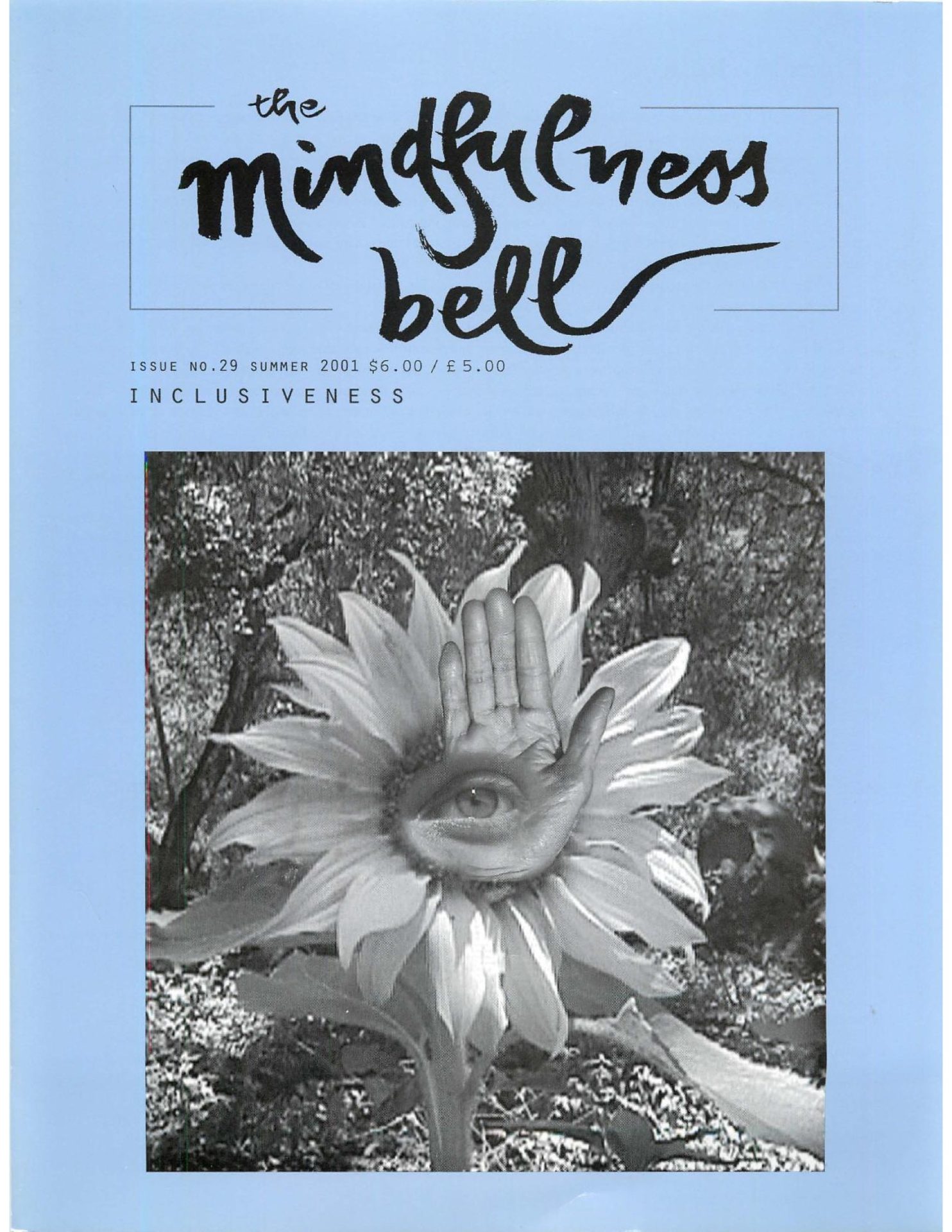Excerpt from Old Path White Clouds By Thich Nhat Hanh
One day, as the Buddha and bhikkhus were begging in a village near the banks of the Ganga, the Buddha spotted a man carrying nightsoil. The man was an untouchable named Sunita. Sunita had heard about the Buddha and bhikkhus, but this was the first time he had ever seen them. He was alarmed, knowing how dirty his clothes were and how foul he smelled from carrying nightsoil.
Excerpt from Old Path White Clouds By Thich Nhat Hanh
One day, as the Buddha and bhikkhus were begging in a village near the banks of the Ganga, the Buddha spotted a man carrying nightsoil. The man was an untouchable named Sunita. Sunita had heard about the Buddha and bhikkhus, but this was the first time he had ever seen them. He was alarmed, knowing how dirty his clothes were and how foul he smelled from carrying nightsoil. ... He hastily put the buckets of nightsoil down and looked for a place to hide. Above him stood the bhikkhus in their saffron robes, whiIe before him approached the Buddha and two other bhikkhus. Not knowing what else to do, Sunita waded up to his knees in water and stood with his palms joined.
Curious villagers came out of their homes and lined the shore to watch what was happening. Sunita had veered off the path because he was afraid he would pollute the bhikkhus. He could not have guessed the Buddha would follow him. Sunita knew that the Sangha included many men from noble castes. He was sure that polluting a bhikkhu was an unforgivable act. He hoped the Buddha and bhikkhus would leave him and return to the road. But the Buddha did not leave. He walked right up to the water's edge and said, "My friend, please come closer so we may talk."

Sunita, his palms still joined, protested, "Lord, I don't dare!"
"Why not?" asked the Buddha.
"I am an untouchable. I don't want to pollute you and your monks."
The Buddha replied, "On our path, we no longer distinguish between castes. You are a human being like the rest of us. We are not afraid we will be polluted. Only greed, hatred, and delusion can pollute us. A person as pleasant as yourself brings us nothing but happiness. What is yom name?"
"Lord, my name is Sunita."
"Sunita, would you like to become a bhikkhu like the rest of us?"
"I couldn 't!"
"Why not?"
''I'm an untouchable!"
"Sunita, I have already explained that on our path there is no caste. In the Way of Awakening, caste no longer exists. It is like the Ganga, Yamuno, Aciravati, Sarabhu, Mahi and Rohini rivers. Once they empty into the sea, they no longer retain their separate identities. A person who leaves home to follow the way leaves caste behind whether he was born a brahman, ksatriya, sudra or untouchable.(1) Sunita, if you like, you can become a bhikkhu like the rest of us." ...
The Buddha handed his bowl to Meghiya and reached his hand out to Sunita. He said, "Sariputta! Help me bathe Sunita. We will ordain him a bhikkhu right here on the bank of the river." .. .
Never in the history of Kosala had an untouchable been accepted into a spiritual community. Many condemned the Buddha for violating sacred tradition. Others went so far as to suggest that the Buddha was plotting to overthrow the existing order and wreak havoc in the country.
The Buddha said, "Accepting untouchables into the sangha was simply a matter of time. Our way is a way of equality. We do not recognize caste. Though we may encounter difficulties over Sunita's ordination now, we will have opened a door for the first time in history that future generations will thank us for. We must have courage." ...
Before long, the uproar over Sunita's ordination reached the ears of King Pasenadi. A group of religious leaders requested a private audience with him and expressed their grave concerns over the matter. Their convincing arguments disturbed the king, and although he was a devoted follower of the Buddha, be promised the leaders that he would look into the matter. Some days later he paid a visit to Jetavana.
He climbed down from his carriage and walked into the monastery grounds alone. Bhikkhus passed him on the path beneath the cool shade of trees. The king followed the path that led to the Buddha's hut. He bowed to each bhikkhu he passed. As always, the serene and composed manner of the bhikkhus reinforced his faith in the Buddha. Halfway to the hut, he encountered a bhikkhu sitting on a large rock beneath a great pine tree teaching a small group of bhikkhus and lay disciples. It was a most appealing sight. The bhikkhu offering the teaching looked less than forty years old, yet his face radiated great peace and wisdom. His li steners were clearly absorbed by what he had to say. The king paused to listen and was moved by what he heard . But suddenly he remembered the purpose of his visit, and he continued on his way . . ..
The Buddha welcomed the king outside his hut, inviting him to sit on a bamboo chair. After they exchanged formal greetings, the king asked the Buddha who the bhikkhu sitting on the rock was. The Buddha smiled and answered, "That is Bhikkhu Sunita. He was once an untouchable who carried nightsoil. What do you think of his teachings?"
The king felt embarrassed. The bhikkhu with so radiant a bearing was none other than the nightsoil carrier Sunita! He would never have guessed such was possible. Before he knew how to respond, the Buddha said, "Bhikkhu Sunita has devoted himself wholeheartedly to his practice from the day of hi s ordination. He is a man of great sincerity, intelligence, and resolve. Though he was ordained only three months ago, he has already earned a reputation for great virtue and purity of heart. Would you like to meet him and make an offering to this most worthy bhikkhu?"
The king replied with frankness, "I would indeed like to meet Bhikkhu Sunita and make an offering to him. Master, your teaching is deep and wondrous! I have never met any other spiritual teacher with so open a heart and mind. I do not think there is a person, animal or plant that does not benefit from the presence of your understanding. I must tell you that I came here today with the intention of asking how you could accept an untouchable into your sangha. But I have seen, heard, and understood why. I no longer dare ask such a question. Instead allow me to prostrate myself before you."
1. In traditional Indian society brahman refers to the caste of priests, ksatriya the caste of warriors and such·a the caste of ordinary people. The untouchables are people of the lowest caste who traditionally are not allowed to physically touch people of other castes.

